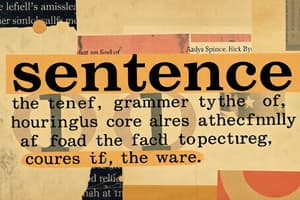Podcast
Questions and Answers
What is a defining characteristic of a simple sentence?
What is a defining characteristic of a simple sentence?
- It consists of two independent clauses joined by a conjunction.
- It includes at least one dependent clause.
- It contains multiple independent clauses.
- It has a subject and a predicate, expressing a complete thought. (correct)
Which of the following structures represents a compound sentence?
Which of the following structures represents a compound sentence?
- Independent Clause + Dependent Clause
- Independent Clause + Coordinating Conjunction + Independent Clause (correct)
- Dependent Clause + Independent Clause
- Independent Clause + Independent Clause + Dependent Clause
Identify the example of a complex sentence.
Identify the example of a complex sentence.
- She won the race and celebrated her victory.
- Although the dog barks, the cat stays calm. (correct)
- The man runs fast, but he is tired.
- The dog barks, and the cat meows.
Which sentence is an example of a compound-complex sentence?
Which sentence is an example of a compound-complex sentence?
What is the main difference between a compound sentence and a complex sentence?
What is the main difference between a compound sentence and a complex sentence?
Which of the following is true about simple sentences?
Which of the following is true about simple sentences?
Which example illustrates a primary feature of compound-complex sentences?
Which example illustrates a primary feature of compound-complex sentences?
In a compound sentence, what is the function of a coordinating conjunction?
In a compound sentence, what is the function of a coordinating conjunction?
Flashcards are hidden until you start studying
Study Notes
Simple Sentences
- Definition: A simple sentence contains a subject and a predicate. It expresses a complete thought.
- Structure: Typically follows the pattern Subject + Verb + (Object).
- Example: "The dog barks."
Compound Sentences
- Definition: A compound sentence consists of two or more independent clauses joined by a coordinating conjunction (for, and, nor, but, or, yet, so) or a semicolon.
- Structure: Independent Clause + Coordinating Conjunction + Independent Clause.
- Example: "The dog barks, and the cat meows."
Complex Sentences
- Definition: A complex sentence contains one independent clause and at least one dependent clause.
- Structure: Independent Clause + Dependent Clause or Dependent Clause + Independent Clause.
- Example: "Although the dog barks, the cat stays calm."
Compound-Complex Sentences
- Definition: A compound-complex sentence has at least two independent clauses and one or more dependent clauses.
- Structure: (Independent Clause + Independent Clause) + Dependent Clause.
- Example: "Although the dog barks, the cat stays calm, and the bird sings."
Key Differences
- Simple Sentence: One independent clause.
- Compound Sentence: Two or more independent clauses.
- Complex Sentence: One independent clause and at least one dependent clause.
- Compound-Complex Sentence: Multiple independent clauses and at least one dependent clause.
Simple Sentences
- Contains a subject and a predicate, expressing a complete thought.
- Follows a basic structure: Subject + Verb + (Object).
- Example: "The dog barks."
Compound Sentences
- Comprises two or more independent clauses linked by coordinating conjunctions (for, and, nor, but, or, yet, so) or a semicolon.
- Structure: Independent Clause + Coordinating Conjunction + Independent Clause.
- Example: "The dog barks, and the cat meows."
Complex Sentences
- Features one independent clause and at least one dependent clause.
- Structure can vary: Independent Clause + Dependent Clause or vice versa.
- Example: "Although the dog barks, the cat stays calm."
Compound-Complex Sentences
- Contains at least two independent clauses along with one or more dependent clauses.
- Structure: (Independent Clause + Independent Clause) + Dependent Clause.
- Example: "Although the dog barks, the cat stays calm, and the bird sings."
Key Differences
- Simple Sentence: Contains a singular independent clause.
- Compound Sentence: Made up of two or more independent clauses.
- Complex Sentence: Includes one independent clause plus at least one dependent clause.
- Compound-Complex Sentence: Consists of multiple independent clauses and a minimum of one dependent clause.
Studying That Suits You
Use AI to generate personalized quizzes and flashcards to suit your learning preferences.




